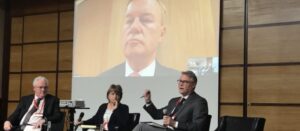I recently spoke at a HEIR (Higher Education Institutional Research) Network event on a research project run at the University of Westminster to understand why many of our undergraduates and taught postgraduates choose to continue in higher education away from Westminster.
Or, in loftier phrasing, the phenomenon of re-enrolment away from their alma mater.
The departure of many students presented a conundrum – given that these students were currently completing or had already completed an undergraduate/postgraduate course with us, surely they would be a readily available and receptive audience?
Apparently not.
So, where did they go?
We used Graduate Outcomes data to identify the study destinations of graduates “in-study” approximately 15 months after graduation. The findings were interesting though not surprising. Examining data from 2017-18 to 2020-21, we identified 259 graduates with known destinations that were not Westminster.
The most striking point was geographical: most study destinations were within the M25. However, even this doesn’t fully capture how close by our former students end up. From our Regent Street campus, the most popular study destinations were on average 5.1 miles away – by comparison, the M25 is roughly 14.5 miles away.
Admittedly, the figures don’t tell us about distance travelled to study. Nevertheless, if these students were willing to travel to Westminster for their undergraduate/postgraduate study and choose to stick close by for further study, it suggests that London matters to them in some way, whether that’s belonging, convenience, prospects, or anything else. Our goal is to capitalise on that.
But why does this even matter? To be completely candid, there is a financial driver: re-enrolling students are an important source of income. Money keeps the lights on.
However, beneath this cold rationalism is a deeper motivation. We know from our institutional data that we serve our local community, many members of which represent non-traditional groups in HE. In our absence, there is a serious risk that these communities miss out on opportunities available to others. Money keeps the lights on, in order that we can serve our community.
The scales of re-enrolment
The following insights are based on 19 one-to-one interviews with a mixture of undergraduate, postgraduate taught and PhD candidates. Participants included undergraduates seriously considering re-enrolling, and those adamant that they won’t; former undergraduates who re-enrolled at Westminster for Masters study, as well as those who opted to go elsewhere; and current PhD candidates who completed an undergraduate and/or Masters at Westminster.
As you might imagine, the range of courses on offer is a massive driver/deterrent. So, while Westminster’s Prisons Project is a draw for those interested in pursuing criminology and related careers, anyone who aspires to be a teacher will be leaving to get their Postgraduate Certificate of Education, as we don’t offer this.
Many of those interviewed, especially current undergraduates, felt that further study should enhance their employment and salary prospects. A Masters was generally perceived as a step in the right direction in this regard. However, some students felt universities were pushing undergraduates into postgraduate study, undermining the value of their first degree in the process.
Ranking may be important for re-enrolment, though it appears less important as you move through the study levels. Institutional prestige may be another factor driving or deterring re-enrolment and may reinforce or override ranking. Sometimes you have to face the fact that graduates want to experience a different environment.
A sense of belonging, manifesting here as a strong teacher-student relationship and existing networks of support, often built over years. Numerous PhD candidates spoke about how a particular academic convinced them to do a PhD, while students in receipt of Disability Learning Support (DLS) spoke of how arrangements and relationships with the DLS team were not worth giving up to move to another institution.
It will come as no surprise that money plays a decisive role for many graduates when it comes to thinking about re-enrolment. Interestingly, cost of living concerns were not prominent, with apprehensions about study fees taking primacy.
Personal, structural and institutional factors matter too. For example, perceptions of teaching and education quality can stack the re-enrolment odds in favour or against. Additionally, conversations with undergraduates who were the first-in-family to attend HE highlighted gaps in their knowledge about postgraduate study, from when and how to apply, to academic expectations. These lacunae could make postgraduate study seem overwhelming and deter application.
As you might guess, it was not possible to pinpoint a universal factor that determined the decision to re-enrol or not. When considering how students weigh the decision “to re-enrol or not re-enrol”, it is helpful to visualise a set of scales, the pros and cons and their corresponding weights being added to the appropriate side.
Tipping the scales in your favour
Fortunately, there are things HE providers can do to tip the balance in their favour.
Of course, you need to regularly look at and review your course offer. And it is important to read the runes of institutional data down to course level to understand where re-enrolment is strongest and ask why. Get creative with alumni discounts by offering variable rates, with a bigger discount incentivising immediate re-enrolment. Review the financial support on offer and ask whether it is effectively targeted. Communicate clearly and candidly with students about the realities of postgraduate study early and periodically in the student lifecycle, while being sensitive in the messaging so as not to undervalue first degrees.
And for potential PhDs in particular, showcase the brilliance of your academics in creative and personal ways – think student testimonial videos attached to the online profiles of their academic supervisors. Most important of all, keep talking to, listening to and knowing your students.




